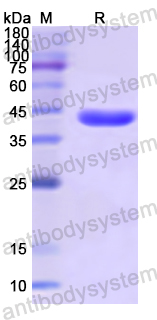Catalog No.
YHH24601
Expression system
E. coli
Species
Homo sapiens (Human)
Protein length
Thr2-Asp407
Predicted molecular weight
44.33 kDa
Nature
Recombinant
Endotoxin level
Please contact with the lab for this information.
Purity
>90% as determined by SDS-PAGE.
Accession
Q16186
Applications
ELISA, Immunogen, SDS-PAGE, WB, Bioactivity testing in progress
Form
Lyophilized
Storage buffer
Lyophilized from a solution in PBS pH 7.4, 0.02% NLS, 1mM EDTA, 4% Trehalose, 1% Mannitol.
Reconstitution
Reconstitute in sterile water for a stock solution. A copy of datasheet will be provided with the products, please refer to it for details.
Shipping
In general, proteins are provided as lyophilized powder/frozen liquid. They are shipped out with dry ice/blue ice unless customers require otherwise.
Stability and Storage
Use a manual defrost freezer and avoid repeated freeze thaw cycles. Store at 2 to 8°C for frequent use. Store at -20 to -80°C for twelve months from the date of receipt.
Alternative Names
Adhesion-regulating molecule 1, ADRM1, GP110, Rpn13 homolog, 110 kDa cell membrane glycoprotein, hRpn13, Gp110, Proteasome regulatory particle non-ATPase 13, ARM-1, Proteasomal ubiquitin receptor ADRM1
Computational prediction of Homo sapiens-Candida albicans protein-protein interactions reveal key virulence factors using dual RNA-Seq data analysis., PMID:40188396
Effects of ADRM1 on osteoblast differentiation and mineralization in osteoporosis., PMID:39959199
Spliced exon9 ADRM1 promotes liver oncogenicity via selective degradation of tumor suppressor FBXW7., PMID:39788431
Deficiency of SIAH1 promotes the formation of filopodia by increasing the accumulation of FASN in liver cancer., PMID:39075049
Proteome-wide Ligand and Target Discovery by Using Strain-Enabled Cyclopropane Electrophiles., PMID:39018468
Preclinical studies of RA475, a guanidine-substituted spirocyclic candidate RPN13/ADRM1 inhibitor for treatment of ovarian cancer., PMID:38990850
The high expression of ADRM1 in hepatocellular carcinoma is closely related to tumor immune infiltration and is regulated by miR-891a-5p., PMID:38890391
Screening of Candidate Inflammatory Markers of Epithelial Cells in Hepatocellular Carcinoma Based on Integration Analysis of TCGA/ICGC Databases and Single-cell Sequencing., PMID:38299418
hRpn13 shapes the proteome and transcriptome through epigenetic factors HDAC8, PADI4, and transcription factor NF-κB p50., PMID:38151017
Downregulation of pro-surfactant protein B contributes to the recurrence of early-stage non-small cell lung cancer by activating PGK1-mediated Akt signaling., PMID:37946295
Hepatitis B virus infection disrupts homologous recombination in hepatocellular carcinoma by stabilizing resection inhibitor ADRM1., PMID:37815873
Adhesion-regulating molecule 1 (ADRM1) can be a potential biomarker and target for bladder cancer., PMID:37684377
Identification of Immune-Linked Hub Genes and Diagnostic Model Construction in Schizophrenia., PMID:37552420
LIM Homeobox 2 Increases Adhesion-Regulating Molecule 1 Transcription to Facilitate the Pathological Progression of Oxidized Low-Density Lipoprotein-Stimulated Atherosclerotic Cell Models., PMID:37518356
ADRM1/RPN13 attenuates cartilage extracellular matrix degradation via enhancing UCH37-mediated ALK5 deubiquitination., PMID:37406898
Genomic Landscape of Copy Number Variations and Their Associations with Climatic Variables in the World's Sheep., PMID:37372436
Development and anticancer properties of Up284, a spirocyclic candidate ADRM1/RPN13 inhibitor., PMID:37315065
Potential of adhesion-regulating molecule 1 (ADRM1) as a biomarker for patients with renal clear-cell carcinoma or papillary-cell carcinoma., PMID:37268471
GMEB2 Promotes the Growth of Colorectal Cancer by Activating ADRM1 Transcription and NF-κB Signalling and Is Positively Regulated by the m6A Reader YTHDF1., PMID:36551532
Exosomal circ-ADRM1 promotes lung adenocarcinoma progression and induces macrophage M2 polarization through regulating MMP14 mRNA and protein., PMID:36454975
HMG20A was identified as a key enhancer driver associated with DNA damage repair in oral squamous cell carcinomas., PMID:36335317
Ubiquitin receptors play redundant roles in the proteasomal degradation of the p53 repressor MDM2., PMID:35735670
mRNA-miRNA bipartite networks reconstruction in different tissues of bladder cancer based on gene co-expression network analysis., PMID:35393513
Structure-guided bifunctional molecules hit a DEUBAD-lacking hRpn13 species upregulated in multiple myeloma., PMID:34916494
Development of a prognostic signature of patients with esophagus adenocarcinoma by using immune-related genes., PMID:34724890
Kinectin1 depletion promotes EGFR degradation via the ubiquitin-proteosome system in cutaneous squamous cell carcinoma., PMID:34689164
Chirality and asymmetry increase the potency of candidate ADRM1/RPN13 inhibitors., PMID:34506530
Identification of novel anti-tumor therapeutic target via proteomic characterization of ubiquitin receptor ADRM1/Rpn13., PMID:33441535
Proteasome-Bound UCH37/UCHL5 Debranches Ubiquitin Chains to Promote Degradation., PMID:33156996
ADRM1 as a therapeutic target in hepatocellular carcinoma., PMID:32916039
Mechanistic Studies of the Multiple Myeloma and Melanoma Cell-Selective Toxicity of the Rpn13-Binding Peptoid KDT-11., PMID:32857986
Physical and Functional Analysis of the Putative Rpn13 Inhibitor RA190., PMID:32857985
Unveiling the immunomodulatory properties of Haemonchus contortus adhesion regulating molecule 1 interacting with goat T cells., PMID:32811556
Impact of Losing hRpn13 Pru or UCHL5 on Proteasome Clearance of Ubiquitinated Proteins and RA190 Cytotoxicity., PMID:32631902
Unstructured Biology of Proteins from Ubiquitin-Proteasome System: Roles in Cancer and Neurodegenerative Diseases., PMID:32455657
Proteomic analysis identifies mechanism(s) of overcoming bortezomib resistance via targeting ubiquitin receptor Rpn13., PMID:32424294
[Qualitative difference of mitochondrial subproteoms of brain RPN10- and RPN13-binding proteins]., PMID:32420894
Bis-benzylidine Piperidone RA190 treatment of hepatocellular carcinoma via binding RPN13 and inhibiting NF-κB signaling., PMID:32375699
The CCDC43-ADRM1 axis regulated by YY1, promotes proliferation and metastasis of gastric cancer., PMID:32278016
An Extended Conformation for K48 Ubiquitin Chains Revealed by the hRpn2:Rpn13:K48-Diubiquitin Structure., PMID:32160516
Structure-function analyses of candidate small molecule RPN13 inhibitors with antitumor properties., PMID:31940398
HDAC8 affects MGMT levels in glioblastoma cell lines via interaction with the proteasome receptor ADRM1., PMID:31798765
Unfolding or aggregation, that is the question., PMID:31704773
Prognostic and Therapeutic Significance of Adhesion-regulating Molecule 1 in Estrogen Receptor-positive Breast Cancer., PMID:31669266
Ubiquitin receptors are required for substrate-mediated activation of the proteasome's unfolding ability., PMID:31601863
Blockade of ubiquitin receptor Rpn13 in plasmacytoid dendritic cells triggers anti-myeloma immunity., PMID:31406111
Acute unfolding of a single protein immediately stimulates recruitment of ubiquitin protein ligase E3C (UBE3C) to 26S proteasomes., PMID:31375563
Phosphorylation of Tyr-950 in the proteasome scaffolding protein RPN2 modulates its interaction with the ubiquitin receptor RPN13., PMID:31064842
Development and preclinical validation of a novel covalent ubiquitin receptor Rpn13 degrader in multiple myeloma., PMID:30962579
Identification of differentially expressed proteins in the injured lung from zinc chloride smoke inhalation based on proteomics analysis., PMID:30770755

